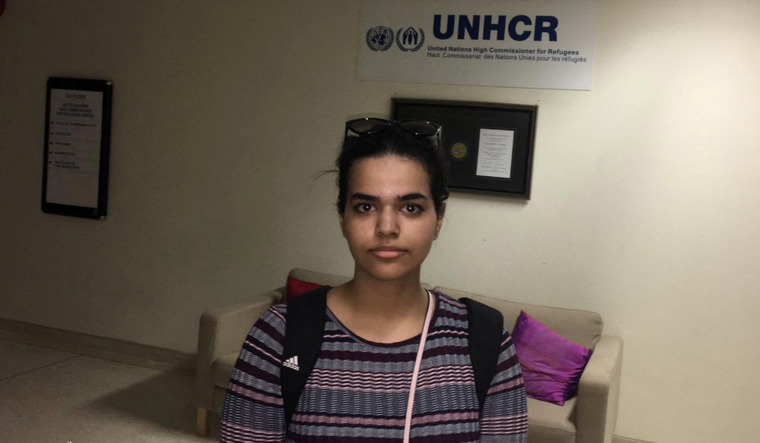Rahaf Mohammed Alqunun, who fled her family in Saudi Arabia and feared for her life if deported back from Thailand where she had barricaded herself in an airport hotel room, has been offered asylum in Canada.
The 18-year-old reportedly left for Canada on Friday night from Bangkok. Rahaf had used the power of social media to her advantage and had managed to gather international attention on her plight.
She fled her family while visiting Kuwait and flew to Bangkok. After Thai authorities stopped her, she barricaded herself in her airport hotel room and demanded to meet the representatives of the office of the UN High Commissioner for Refugees.
She broadcast her ordeal on Twitter and documented her standoff with the authorities real time. Thousands immediately followed her Twitter account, with many of her friends and activists bolstering the social media campaign using the hashtag #SaveRahaf, allowing her to to stave off deportation.
Thailand officials, who were initially on the attack mode, changed their tactics as the world started noticing Rahaf's ordeal and promised to help her soon.
She was admitted to Thailand on Monday while the UN refugee agency processed her request. Though Australia had come forward to offer her asylum, Rahaf preferred Canada.
"The story ends today," said the head of Thailand's immigration bureau, Surachate Hakparn. "Ms. Rahaf is going to Canada as she wishes"
He said Rahaf left Thailand on a flight en route to Toronto. She was in good health and spirits, he said, and had a "smiling face."
Rahaf's case highlights the cause of women's rights in Saudi Arabia, where even now women are required to take permission from their male guardians to travel abroad, marry or even work.
According to human rights activists, many such incidents have taken place earlier too, but went unreported and most of the women who flee their abusive families are forced to return to them.
Rahaf is flying to Toronto via Seoul, South Korea, according to Thai immigration Police Chief Surachate Hakparn. Canadian Prime Minister Justin Trudeau confirmed his country had granted her asylum.
It wasn't immediately clear what prompted Rahaf to choose Canada over Australia. Australian media reported that UNHCR had withdrawn its referral for Rahaf to be resettled in Australia because Canberra was taking too long to decide on her asylum.
Rahaf's father arrived in Bangkok on Tuesday, but his daughter refused to meet with him. Surachate said the father, whose name has not been released, denied physically abusing Rahaf or trying to force her into an arranged marriage, which were among the reasons she gave for her flight. He said Rahaf's father wanted his daughter back but respected her decision.
"He has 10 children. He said the daughter might feel neglected sometimes," Surachate said.
Canada's decision to grant her asylum could further upset the country's relations with Saudi Arabia.
In August, Saudi Arabia expelled Canada's ambassador to the kingdom and withdrew its own ambassador after Canada's Foreign Ministry tweeted support for women's right activists who had been arrested. The Saudis also sold Canadian investments and ordered their citizens studying in Canada to leave.
No country, including the U.S., spoke out publicly in support of Canada in that spat with the Saudis.
On Friday, Trudeau avoided answering a question about what the case would mean for relations with the kingdom, but he said Canada will always unequivocally stand up for human rights and women's rights around the world.


